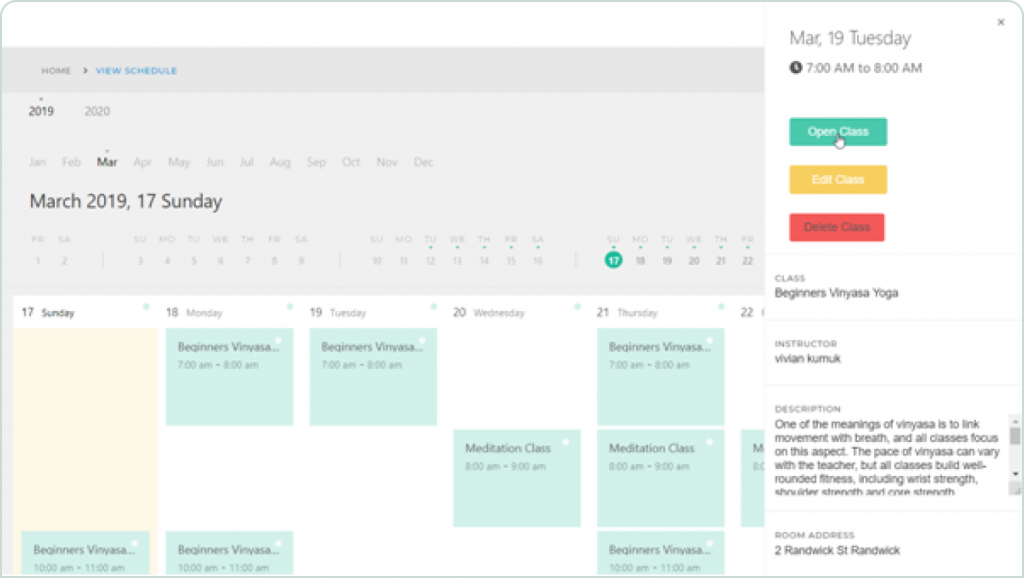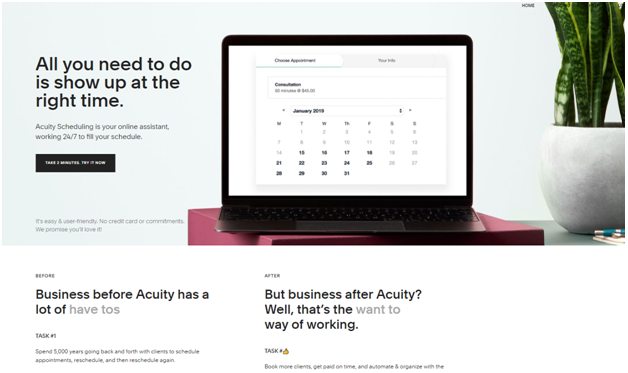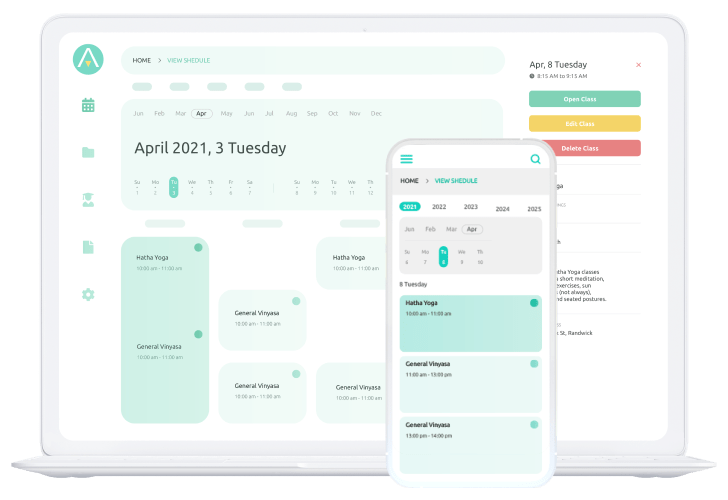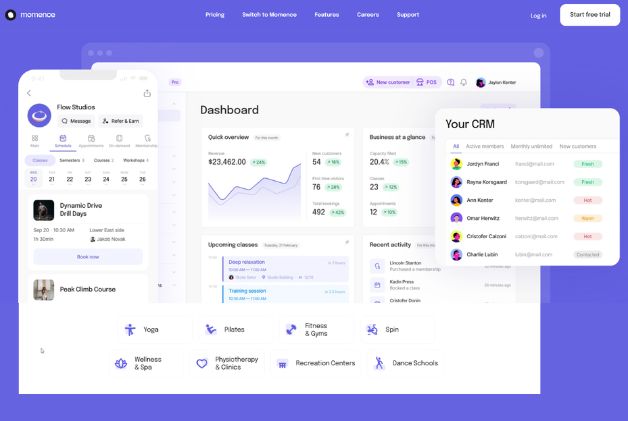
Top 9 Yoga Studio Management Software Platforms in Australia (2025 Guide)
As a yoga practitioner and social person, I frequently visit various yoga studios in India and abroad. One small studio I recently visited impressed me with its beautiful space and how efficiently it ran, thanks to smart use of studio management software.
The studio was well-managed by an online booking system, which helped the staff and teachers be quick and efficient with their clients.
Comparison Table Of Top Yoga Studio Management Software
| Software | Best For | Free Trial | Starting Price | Local Support |
|---|---|---|---|---|
| KRIYA | AUS-based solo/small studios | ✅ | $29 AUD/month | ✅ |
| Mindbody | Large studios + franchises | ✅ | $159 USD/month | ❌ |
| Momence | Hybrid (in-person + online) | ✅ | Custom pricing | ❌ |
| Acuity | 1:1 sessions + small studios | ✅ | $14 USD/month | ❌ |
| Bookamat | Freelancers + mobile studios | ✅ | $25 AUD/month | ✅ |
| WellnessLiving | Studios offering promotions & campaigns | ✅ | From $59 USD/month | ❌ |
| Punchpass | Simplicity and class passes | ✅ | From $39 USD/month | ❌ |
| StudioBookings | Basic, budget-friendly setup | ✅ | $25 USD/month | ❌ |
| Nabooki | Medium-sized studios | ✅ | Custom pricing | ✅ |
Three primary benefits of using an online booking system
Yoga studios that utilise online booking and management software offer numerous benefits. Here are the three significant benefits of using an online booking system
1. You are open to bookings 24.7
This means your studio business is open 24/7 for yoga students or clients. Customers who decide to book your class don’t want to wait until you’re in the studio — they want to secure the activity on their schedule. Using an online booking system means that your business is open 24 hours a day, seven days a week.
2. You can maximise the timetable and classes
Clients who book yoga classes are more likely to show up, making no-shows a thing of the past.
If a yoga student needs to cancel, the class automatically becomes available online, allowing another student to book it. By maximising your timetable and classes, you won’t leave unused activity spots or classes on the timetable. It also means you won’t get caught in a dreaded game of telephone tag.
Also, it’s easy to manage your calendar. Online booking systems enable you to check your timetable or events and availability from anywhere, using any device, whether mobile or PC. You always know the status of your business, and your schedule can be easily managed from a convenient location.
3. You are instantly paid and get your business insights
With an online booking system, you can require customers to prepay for all yoga classes or yoga activities. After all your business needs to grow with revenue. It also helps ensure that on the day of the event, you don’t have to worry about payment, giving you and your customers more time to focus on their fitness and yoga well-being.
An online booking system provides you with a dashboard of analytics that helps you grow your business. You can quickly determine your most popular classes, in-demand time slots, or the most requested add-ons by using an online booking system with robust insights. Take advantage of knowing what your students want most, thereby saving you time and money on offerings that don’t help your business grow.
What should you, as a studio owner, look for in a yoga studio booking and management software?
As a studio owner, you should look for the following in the best booking and management software:
1. Budget/Pricing

Obviously, as a new startup in your yoga business, you are more concerned about your budget. Therefore, you prefer to go for prices that are not too high when you, as a studio owner, are looking for a booking and management software. The online booking systems should also cater to your studio and offer a budget-friendly option.
Suppose the best yoga studio management software offers you the ability to streamline your business by consolidating all operations in one place. In that case, it should also provide affordable pricing with no contracts.
Cost-effectiveness is a crucial factor when starting a yoga business, and good management software should handle pricing accordingly. Some providers offer plans starting from around AUD $35/month, though pricing varies based on features and studio size.
2. Easy to learn

Online booking and management software should be easy to learn. This means the navigation process should be straightforward and uncomplicated. Even a layperson can learn how to use the online booking system, making it a more effective online management software.
Easy navigation is also a crucial feature to find in the best yoga studio management software. You don’t want to waste your time fiddling with the software, and don’t know which tab works for what. The software’s navigation should be straightforward, providing a clear guide to help users learn how to use it. A video guide is also practical for a yoga studio owner who is not a technical expert.
The same applies to yoga students who wish to use this software for booking their classes and making online payments. You came to use yoga management software to accomplish your marketing needs, manage client retention, and analyse your data, rather than spending hours on how to do it.
The software should communicate the features and options available in the navigation tools, using simple and easy-to-understand language across all devices.
3. Easy to use

Online booking and management software should have a clean, intuitive dashboard that makes it simple to customise your timetable, manage classes, and view key data at a glance.
4. Processing fees are easy

The online booking and management software should offer you friendly modes for processing fees, taking payments for your classes and more. Online transactions should be free from technical glitches and work smoothly for you and your students.
5. Offer friendly support

The best online booking and management software should offer friendly support 24/7. You need to obtain access to their email support, live chat, or toll-free number, if possible. Also, the response time should not be too late. The normal response time for any booking software should be within 24 hours of your contact or the same day.
A few other features of the best Yoga Studio Management Software
i – Manage Your Yoga Class Schedules
This is the foremost feature that every yoga studio management software should include in its program. As a yoga studio owner, you should be able to manage your classes, schedule your yoga sessions according to your timetable, and have a safe and reliable payment system.
All these features should be accessible on all platforms, including the mobile app, PC, or Laptop, so that you can manage your business instantly with the click of a few taps.
You can then easily schedule and cancel yoga classes, view students’ profiles and activity, and manage payments all in one place. When you use this tool, all that information is automatically updated and synced across all your accounts and devices, informing you instantly of all the changes and updates that have been made.
Additionally, this feature in the best yoga studio management software is tailored specifically for students, allowing them to manage their profiles, book or cancel yoga classes, and pay accordingly.
ii – Get Automated Yoga Marketing

A key feature of the best yoga studio management software is automated yoga marketing. Running a yoga studio is a business, after all, and you need to market your service to attract more clients. The best yoga studio management software will ideally provide you with automated marketing services.
This means you don’t have to rush from one platform to another, spreading your message across different media channels; rather, you have a simple program or software that helps you with marketing all in one place.
You will have the opportunity to customise your marketing campaign to meet your studio’s specific needs with a variety of options. Many yoga studio management software and booking systems even offer custom email templates, allowing you to easily write and send marketing or sponsored emails to new and existing clients. You can even start an online campaign for yoga students and teachers, allowing them to provide you with valuable feedback to run your business with greater confidence.
This way, you can increase your client retention, as the yoga management software tool can automatically send push notifications to students and offer them a pass or membership choices, motivating them to join your studio. Such an automated yoga marketing approach can keep your students engaged with your studio.
Some of the other features that make a yoga studio management software the best include online store options, integration with your website, cloud computing, and many more.
The Top 9 Best Yoga Studio Management Software In Australia
Here are the top nine best yoga studio management software in Australia to compare and then understand which of the Yoga management and booking systems works best for you.
1. Acuity Scheduling
Advantages: Acuity is a user-friendly software that offers an intuitive interface and is compatible with various platforms. It is user-friendly, where you can even sync with Multiple Calendars, create multiple “Groups,” & Email Reminders. It also features a syncing Option for Quick support service and offers unlimited customisation of customer intake forms with customer support.
Disadvantages: The main disadvantage of this software is that it offers no great support. Also, the free subscriber options are limited. You will need to pay for the full service, but you cannot pay to add individual aspects of it.
2. KRIYA Booking System
Advantages: KRIYA booking system is Australian-based. Specifically designed for Australian yoga and Pilates studios, KRIYA is easy to set up, supports Stripe payments, and comes with dedicated local support. Blends with both Yoga teachers and yoga students, making it beneficial as a business and as a service.
Clients can download and use the KRIYA Booking App to pay and book classes and terms.
KRIYA is affordable and offers local support in Australia.
Disadvantages: It is relatively new and has yet to build trust among yoga studios.
3. Mindbody

Advantages: It is reliable due to its widespread popularity. Their app works well even with reports. It is dynamic in design and is quite adaptable. You can easily schedule appointments, send email confirmations, and gain easy access.
Disadvantages: It is pretty costly, overpriced, and not very practical for new and small yoga studios. On the app for students and clients, the “Explore” feature is less intuitive than it was previously. Processing times are never consistent, and even contact integration is not always accurate. Customer service has received mixed reviews, and some users report inconsistent support response times. Inability to capture credit card info from the client at booking, integration with the website is clunky, high monthly cost, the app doesn’t require the client to enter a phone number, SMS alerts to staff are only possible when the client has opted in to also receive SMS appointment notifications.
While Mindbody is still one of the most powerful platforms available, it now offers a Starter plan that may suit smaller studios, though it’s still more expensive than others.
4. Punchpass
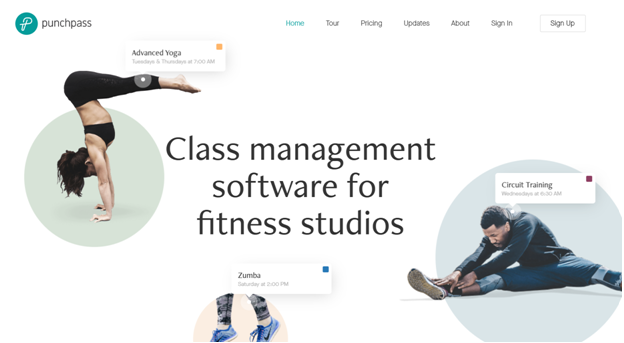
Advantages: This booking system is simple to use. More useful for students, as it provides the total number of passes sold, which helps with the books. Clients appreciate receiving emails when they need to make another purchase.
Disadvantages: There are fewer features, such as no reporting dashboard. Customer service is not friendly.
5. Nabooki
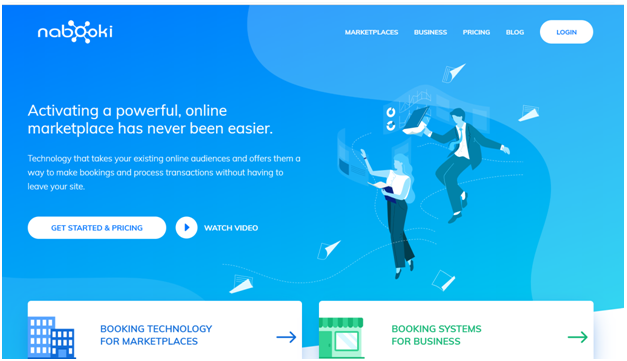
Advantages: Ideal for medium-sized yoga studios and easy to use. Additionally, post-sales customer service is excellent, and you can customise the booking as you prefer.
Disadvantages: There is little time saved when using it with the phone. No calendar display is available for customers to select from. Some features have a few glitches.
6. Wellness Living

Advantages: This software offers numerous options and caters to a wide range of markets. The ability to set sales, share coupons, and email campaigns is invaluable. Navigation is easy, and even on mobile, you can integrate many of the options, which is an excellent assist.
Disadvantages: The automation of marketing and design is somewhat limited in terms of customisation compared to the rest of the site. There were options, but there was an expectation or more. The software occasionally glitches, making it difficult for yoga students and members to access the schedule, which is a significant issue. The app also lacks some crucial features and overrides permissions.
7. Bookamat

Advantages: Bookamat offers scheduling software for Pilates, Yoga, and Fitness studios, as well as freelance instructors. Clients can quickly take responsibility for their schedules and become more compliant. They appreciate the ability to manage cancellations, waitlisting, or rescheduling appointments at their convenience.
Disadvantages: The product is web-based and requires a significant amount of mobile data. It would be great if it could be offered as an App. The page times out if used continuously throughout the day and requires periodic logging in. This can be a bit frustrating. New clients may find the format a little tricky to navigate at first, but they soon become accustomed to it. The product does not offer many features in terms of reporting and accounting functions, although these are reportedly planned for the future.
While Bookamat doesn’t have a native app yet, its web interface is optimised for mobile and performs well on most devices.
8. Studio Bookings
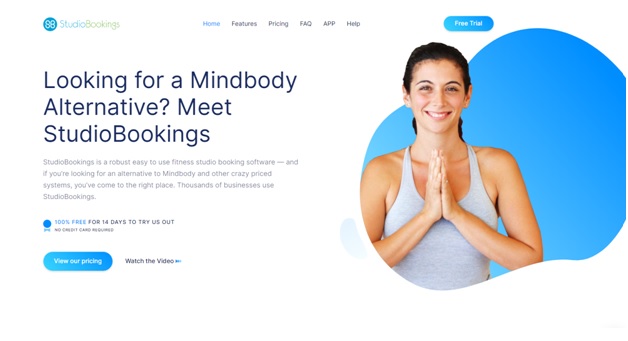
Advantages: The software is easy to use and has a straightforward basic structure. The customer support is good, and the booking software comes with a great and reasonable price.
Disadvantages: As the software offers a basic and straightforward format, it lacks flexibility and has numerous limitations. There is no waitlist in the booking schedule, and there is no capability to track no-shows or cancellations. The payment options are not too bad, but the PayPal options and automatic receipts for students are not functioning correctly.
9. Momence yoga studio software
Advantages: Momence is a modern, all-in-one platform designed for fitness and wellness professionals. It supports live and on-demand classes, automated emails and SMS, memberships, and digital content. The interface is clean and intuitive, and it offers a branded mobile app, client engagement tools, and instructor tracking. Social media and marketing automations are also included.
Disadvantages: It’s more feature-rich than some solo teachers or very small studios may need, and the pricing reflects that. The learning curve can be steeper than simpler tools, and setup time may be longer due to the platform’s breadth of features.
Studio Owners Also Ask
Is training provided for using yoga studio management software?
In most cases, yoga studio management software providers offer some form of training, such as video tutorials, manuals, or even live webinars. If they don’t, you could request one from them or look for external resources.
Can I customise the look and feel of the software to match my studio’s branding?
Customisation options vary between software, but typically, they allow you to add your studio logo and use your brand colours. If this is important to you, it’s worth checking with the software provider beforehand.
How does yoga studio management software handle data privacy and security?
Data privacy and security are essential. Good software providers adhere to the highest standards of data security, including the use of encryption protocols and compliance with relevant data protection regulations. Always check the provider’s data security policies to ensure they meet your requirements.
Is there an option to send automatic reminders or notifications to clients about upcoming classes or renewals through the software?
Most yoga studio management software has a feature to send automated confirmations or emails after an action is performed.
High-end software also provides notifications or reminders to clients. This can include reminders for upcoming classes, renewals, or even promotional messages.
Can the software handle special class events or workshops in addition to regular classes?
Generally, yes. Many yoga studio management software systems have the flexibility to manage special events or workshops in addition to your regular classes.
Can the software manage client waivers and other necessary documentation?
Some software offers features to manage necessary documentation, such as waivers and consent forms. It’s a useful feature to keep all your records digital and in one place.
Can I use yoga studio management software to track my studio’s growth and performance over time?
Absolutely! Most software will provide analytics or reporting features that can help you understand your studio’s performance over time. You can track metrics such as class attendance, revenue, and client growth.
Does the software have capabilities for handling multi-lingual settings?
This depends on the software, but in a globally connected world, many do offer multi-language support. If your studio caters to a diverse clientele, it may be worth finding software that provides this feature.
Can the software handle different levels or types of classes and memberships?
Typically, yes. Most yoga studio management software should be able to handle a variety of class types and membership levels. It’s essential to have a flexible system that grows with your studio.
Does the software provide any SEO or other digital marketing tools to improve my studio’s online presence?
While some may offer basic SEO tools, this is typically not a feature of booking software. It’s always good to check with the software provider.
Does the software support integration with social media platforms for promotional activities?
Some platforms, like Momence and WellnessLiving, do support social media integrations. Others may not, so it’s best to check.
Is the software capable of handling a franchise model if I decide to expand my yoga studio business?
Some more advanced or enterprise-level systems may have the capability to handle multi-location or franchise models. If expansion is in your plans, be sure to check for these features when selecting software.
Can the software handle payroll and compensation management for yoga instructors?
Some software systems offer this feature, while others don’t. If you have a team of instructors, it could be beneficial to find a system that can also handle payroll and compensation.
Does the software provide any features to promote client engagement and retention?
Some software will have features to help with client engagement and retention, such as email marketing, push notifications, and loyalty programs.
Can I offer personalised or one-on-one sessions through the software?
Most yoga studio management software should offer the flexibility to handle both one-on-one sessions and group classes. In my experience, some do it better than others.
Ready to Choose the Right Studio Software?
Most of these platforms offer free trials — take one for a spin and see how it fits your teaching style. Whether you’re just starting out or scaling your studio, the right software can save time and help you grow your business with ease.
Disclaimer: Features and pricing are subject to change. Always check with the provider directly.

